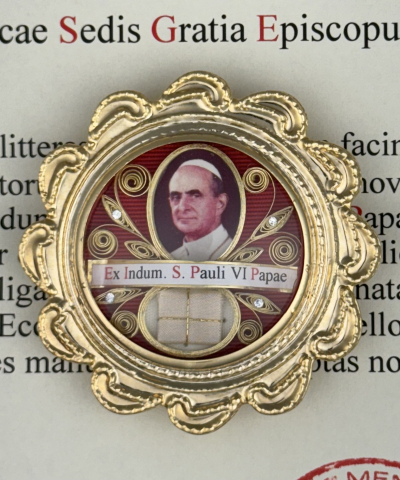Saint Pope Paul VI (†1978) was head of the Catholic Church from 1963 to his death. Succeeding John XXIII, he continued the Second Vatican Council, which he closed in 1965, implementing its numerous reforms. Paul VI took charge of the interpretation and implementation of its mandates, finely balancing the conflicting expectations of various Catholic groups. The resulting reforms were among the widest and most profound in the Church's history. He fostered improved ecumenical relations with Eastern Orthodox and Protestant churches. In January 1964, he flew to Jordan, the first time a reigning pontiff had left Italy in over a century. Paul VI spoke repeatedly at Marian conventions and Mariological meetings, visited Marian shrines, and issued three Marian encyclicals. Following Ambrose of Milan, he named Mary as the Mother of the Church during the Second Vatican Council. He described himself as a humble servant of suffering humanity. He demanded significant changes from the rich in North America and Europe in favor of the poor in the Third World. His opposition to birth control in the 1968 encyclical Humanae vitae was strongly contested, especially in Western Europe and North America. Pope Francis beatified Paul VI on 19 October 2014 and Pope Francis canonized him on 14 October 2018. His liturgical feast is celebrated on 29 May.
Rare round gilt metal reliquary theca housing the second-class ex indumentis (of the clothes) relic of Saint Pope Paul VI. A substantial relic is affixed to a red silk ground surrounded by gilt paperolle ornamentation and a color portrait of the Saint. It is identified in Latin on a bi-color typeset cedula label as Ex Indum.[entis] S. Pauli VI Papae. (of the clothes of Saint Pope Paul VI). On the back, under a protective cap, the theca is secured with a seal of red Spanish wax bearing an imprint of a coat of arms of Fr. Giulio Mencuccini, CP., Bishop of Sanggau. The theca is accompanied by the matching authentics document issued and signed by Bishop Mencuccini on October 14th of 2018 (the day of his Canonization) .
This item is appropriate for private and public veneration. A photograph of the document is available upon request.
Дополнительная Информация
- ID#: 40-RSJP-1
- Размер: 52 mm (2 inches) across
- Возраст: около
- Происхождение: около
- Материалы: около
- Цена: Цена по запросу
Дополнительные Фотографии
https://russianstore.com/ru/online-store/catholic-reliquaries/item/3650-fancy-documented-reliquary-theca-with-a-relic-of-st-pope-paul-vi#sigProIdc1b7a3304f

Level 60 Trading Co,, LLC
1089 Commonwealth Ave #314,
Boston, MA 02215, США
Tel: (+1) 786-206-9894
Наше местное время
Онлайн Магазин
Информация
Быстрые Ссылки

Level 60 Trading Co,, LLC
1089 Commonwealth Ave #314,
Boston, MA 02215, США
Tel: (+1) 786-206-9894
Наше местное время





 Change language to English
Change language to English